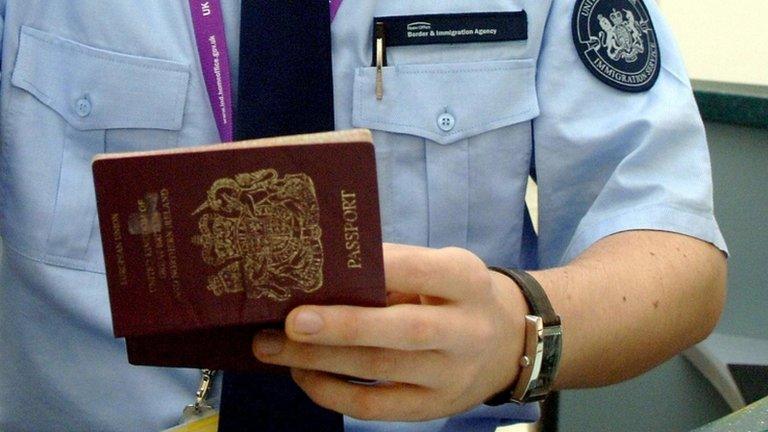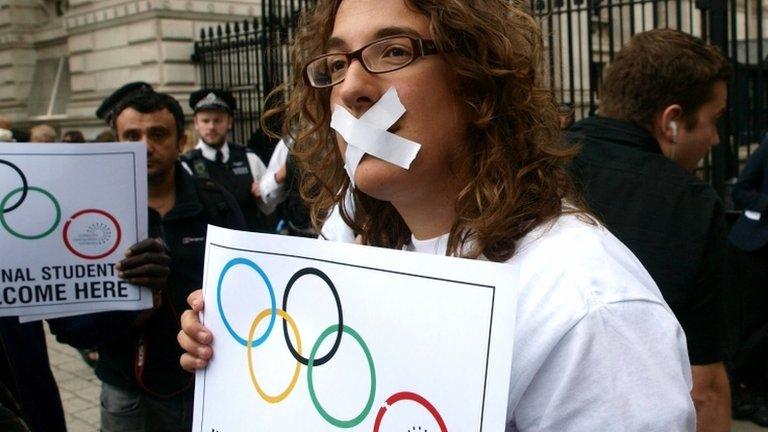Analysis: London Met's foreign students
- Published
- comments
Why has London Metropolitan University been banned from accepting foreign students from outside of the European Union?
The UK Border Agency's decision to revoke its licence comes down to a judgement in government that the institution could not be trusted to help stop illegal immigration.
The UK's modern immigration system has been designed to force universities to do more to make sure that only the right students get in - and that those who should leave do so at the end of their courses.
London Met had a special status as a "Highly Trusted Sponsor" (HTS).
The HTS system was introduced so that universities who benefit directly from migration do what they can to help prevent the education system being used by people who want to work illegally, rather than study.
The system means that a university or college has to take reasonable steps to ensure that an applicant is a genuine student.
Once the university is satisfied with its own assessment, which includes language skills, it provides a certificate that sponsors the individual as they apply for a visa to come to the UK.
If the UKBA does not grant visas to at least eight out of 10 prospective students, it can revoke an institution's HTS status on the grounds that it hasn't been properly checking applicants.
A university can also lose its status if more than 10% of sponsored students don't actually enrol or if there is a significant drop-out rate from the course - both potential signs of students disappearing to work illegally.
Finally, universities must show that enrolled students are making academic progression - turning up and handing in their essays.
Sounds complicated? The full rules on the UKBA website, external run to 72 pages.
Three tests
So what happened at London Met? Basically, it failed three tests.
The UKBA sampled up to 250 files at London Met to see how rigorously it was monitoring its foreign students.
Damian Green: "I am not chucking anyone out... I am enforcing the rules"
In the first test, officials found that 26 out of 101 sampled students had no valid visa to be in the UK. In the second, officials concluded that 142 out of 250 had attendance problems.
When it came to speaking English, 20 of 50 sampled certificates - the university's seal of approval for a student - showed evidence that their English had not been properly tested.
Those results were enough to convince the UKBA that the university had to lose its status.
The question that we simply cannot answer is how many of the students caught up in the middle of all of this are genuine or bogus. The point the UKBA is making is that London Met's procedures were not good enough to know one way or the other.
That, however, is not good enough for the university. Professor Malcolm Gillies, the vice chancellor, has described the UKBA's decision as "not particularly cogent" which is a polite way of saying sheer lunacy.
He goes on: "I would go so far as to say that UKBA has been rewriting its own guidelines on this issue and this is something which should cause concern to all universities in the UK."
The impact of this decision on London Met's foreign students is potentially life-changing. Their visa and permission to be in the UK is entirely dependent on the fact that they are sponsored by a trusted organisation.
If the organisation is no longer trusted, then the student has no right to stay. So, unless its 2,000 non-EU students can find another institution and course, they could be out or pocket within months - and out of the country to boot.
The UKBA has been targeting private colleges in a crackdown on illegal immigration scams - but has it now crossed the Rubicon by going after a university?
London Met has a chequered history and has faced criticism in the past about how it has managed its internal affairs. That's why officials say today that the London Met decision may be a one-off in exceptional circumstances.
But two other universities, Glasgow Caledonian and Teesside, were earlier warned they could lose their status before being given the all clear.
The BBC has learnt that two further universities have sought legal advice amid growing fears that they could lose their HTS status.
So what happens now? Students will scramble to find replacement courses and there could be legal action running to tens of millions of pounds.
Immigration lawyer Edward Wanambwa of Russell Cooke Solicitors says London Met could judicially review the UKBA decision - but students could separately sue the university for their massive personal losses.
"The UKBA has been confusing universities with colleges," he says. "I quite understand why the UKBA is concerned about unscrupulous colleges above a chip shop on the High Street, but they are being overly suspicious of universities."
The bigger picture
One final point. The immigration fate of 2,000 students hardly affects the government's target to cut net migration to tens of thousands by the end of the Parliament.
The latest figures, external - published on the same day that we learnt of the London Met decision - show that the government is still a long way from achieving that goal.
Study remains the most common reason for migrating to the UK estimated at 232,000 in the year to December 2011, just a few thousand down on the previous year.
The Home Office says that more recent data shows a big drop in new student visas and that may, in time, be the deciding factor.
- Published30 August 2012

- Published30 August 2012
